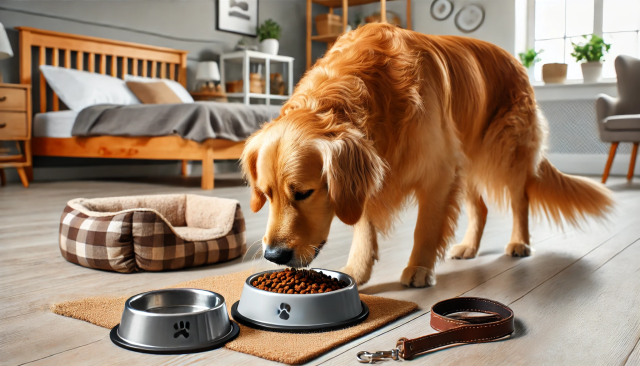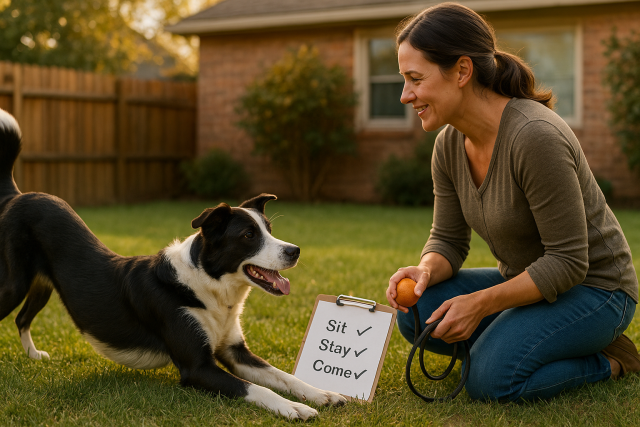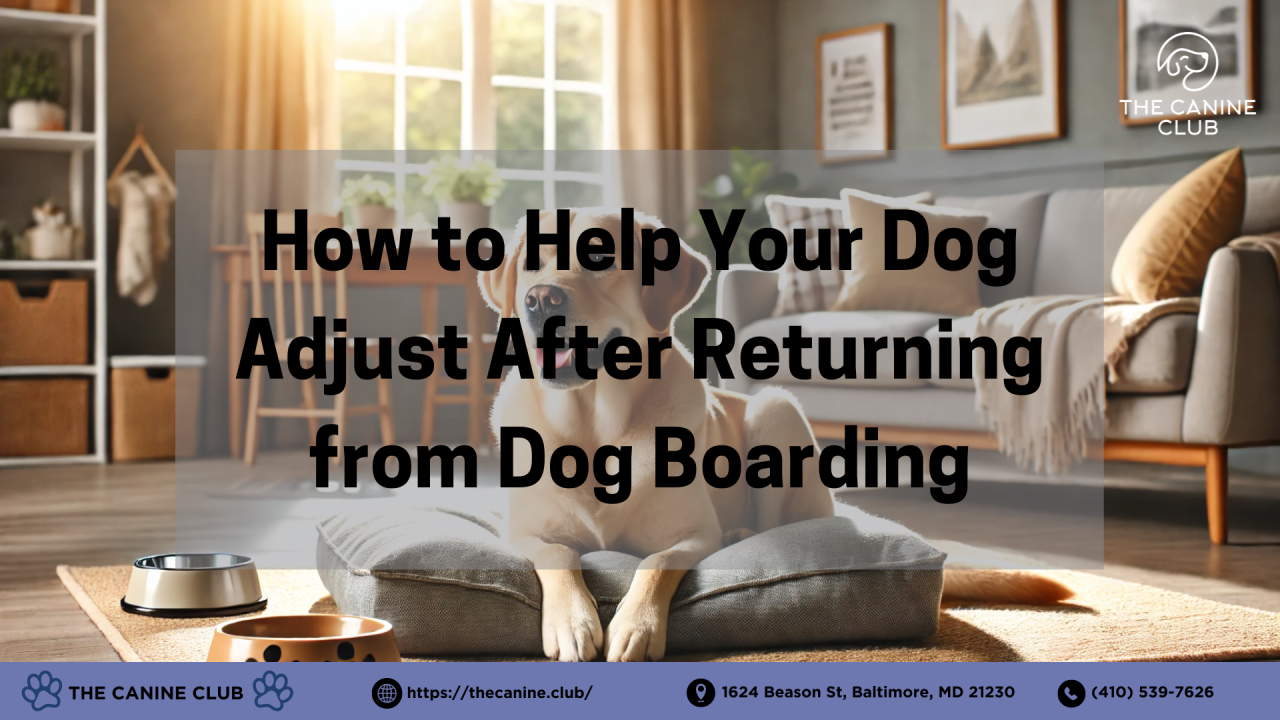You walk in the door, excited to see your dog after your trip—only to find them acting a little… different. Maybe they’re extra clingy, unusually sleepy, or turning their nose up at their food. Sound familiar?
Leaving your dog at a boarding facility while you’re away can be a great way to ensure they’re cared for, but what happens when they come home? Some dogs jump right back into their routine as if nothing happened, while others might show signs of exhaustion, clinginess, or temporary changes in behavior.
If your pup seems a little “off” after returning from boarding, don’t worry—it’s completely normal! Adjusting back to home life can take time, and with a little patience and consistency, your dog will settle in smoothly. In this guide, we’ll explore common post-boarding behaviors and what you can do to help your furry friend transition back to their usual self.
1. Understanding Post-Boarding Behavior
Each dog reacts differently after a stay at a boarding facility. Some may act completely normal, while others might need a few days to adjust. Here are some common post-boarding behaviors and what they mean:
- Exhaustion & Increased Sleep – Boarding can be exciting but also tiring! With so much socialization and activity, many dogs come home ready to catch up on sleep.
- Clinginess or Separation Anxiety – Some dogs become extra attached to their owners after boarding, following them around more than usual.
- Changes in Appetite – Your pup may eat more or less than usual after boarding, which is typically temporary.
- Mild Digestive Upset – Some dogs may experience soft stools due to a change in environment, diet, or excitement.
- Behavioral Changes – Temporary adjustments in mood, such as being more hyper, shy, or independent, can happen as they readjust.
These behaviors usually resolve within a few days. However, if symptoms persist beyond a week, it may be worth checking in with a veterinarian.
2. Give Your Dog Time to Rest
One of the most common post-boarding behaviors is increased tiredness. Even if your dog had a great time at boarding, the excitement of a different environment, playing with other dogs, and adjusting to a new routine can wear them out.
What You Can Do:
- Allow your dog to rest as much as needed after coming home.
- Provide a quiet and comfortable space where they can relax without too much stimulation.
- Avoid overwhelming them with too many activities, visitors, or long outings in the first 24-48 hours.
Some dogs may sleep longer than usual or seem less energetic, which is completely normal. However, if your dog appears excessively lethargic for more than a few days, consult your vet.
3. Stick to a Familiar Routine

Dogs thrive on consistency and routine, and boarding temporarily disrupts their normal schedule. One of the best ways to help them transition back to home life is to reinforce their usual habits as soon as they return.
Ways to Reinstate Their Routine:
✔ Meal times – Feed them at their usual times and avoid major diet changes.
✔ Walks & potty breaks – Stick to their regular walking schedule.
✔ Sleep schedule – Ensure they have access to their normal sleeping spot.
✔ Alone time – If your dog has become more clingy, gradually reintroduce independent time.
Stability and routine will help reassure your pup that everything is back to normal.
4. Monitor Their Eating and Drinking Habits
It’s not uncommon for dogs to eat less or more than usual after boarding. Some dogs may have been too excited to eat properly at the facility, while others may have been given different food or feeding schedules.
How to Handle Eating Adjustments:
- If your dog is eating less, offer their favorite meal and encourage hydration. Appetite should return to normal within a day or two.
- If they’re eating more than usual, avoid overfeeding—this could be due to excitement rather than true hunger.
- Make sure water intake is normal but prevent excessive drinking, which could lead to vomiting.
For more insights into dog nutrition and feeding habits, check out our guide on How to Prepare Your Dog for Their First Day at Dog Daycare.
If your dog refuses to eat or drink for more than 24 hours, consult your veterinarian.
5. Handle Any Behavioral Changes with Patience
Some dogs experience mild behavioral changes after boarding. This could be due to excitement, stress, or adjusting back to a quieter home environment.
Common Temporary Behavioral Changes & How to Address Them:
- Clinginess: If your dog follows you everywhere, gradually encourage short periods of alone time to rebuild independence.
- Hyperactivity: Some dogs may have pent-up energy or excitement. Structured play and short walks can help them settle down.
- Mild Anxiety: Provide a calm, reassuring environment and avoid overwhelming situations.
For more on helping anxious dogs adjust, check out How to Introduce a Nervous Dog to Daycare.
These behaviors are usually temporary and should fade within a few days. If your dog continues to show signs of anxiety or distress, consider consulting a professional trainer.
6. Reintroducing Training and Exercise
Even well-trained dogs may act a little differently after boarding, especially if they experienced a different set of rules while away.
How to Refresh Their Training:
🐾 Reinforce basic commands (sit, stay, come) to reset expectations.
🐾 Use positive reinforcement (treats, praise) to encourage good behavior.
🐾 Avoid overwhelming them with intense exercise immediately—ease them back into their usual activity levels.
Most dogs will readjust quickly with gentle guidance.

7. When to Seek Professional Help
While most dogs bounce back from boarding within a few days, some signs may indicate a bigger concern.
🚩 Red Flags That May Require a Vet Visit:
- Persistent vomiting or diarrhea beyond 48 hours
- Extreme lethargy or refusal to eat for more than a day
- Signs of illness, such as coughing or nasal discharge
- Ongoing severe anxiety or uncharacteristic aggression
If your dog continues to struggle with behavior or emotional distress, a trainer or veterinary behaviorist can offer additional support.
Frequently Asked Questions (FAQs)
1. How long does it take for a dog to adjust after boarding?
Most dogs adjust within 24-72 hours, but some may take up to a week. Providing a stable routine helps speed up the process.
2. Why is my dog acting differently after boarding?
Changes in behavior—such as exhaustion, clinginess, or temporary anxiety—are normal due to the excitement and stimulation of boarding. These behaviors usually resolve with time.
3. Should I let my dog sleep a lot after boarding?
Yes! Extra sleep is common after boarding since dogs are often very active while away. Give them time to rest and recover.
4. My dog isn’t eating after boarding. What should I do?
Some dogs experience temporary appetite changes due to excitement or a different feeding schedule. Encourage eating with their favorite meal, and monitor their hydration.
5. When should I be concerned about my dog’s behavior after boarding?
If your dog shows extreme lethargy, refuses food for more than 24 hours, has persistent vomiting/diarrhea, or acts overly anxious for an extended period, contact your vet.
Give us a call at (410) 539-7626 or visit our website to learn more. Let’s work together to ensure your pup stays happy, active, and well-socialized!
At The Canine Club, we know every dog is different—and that’s why we offer flexible, personalized care that fits your pup’s unique needs. Whether your dog needs a full week of daycare, an occasional play day, a fresh grooming session, or a safe, comfortable stay while you’re away, we’re here to help.
🌐 Explore our services:
📞 Call 410-539-7626

